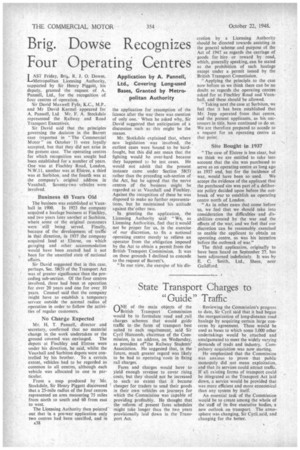State Transport Charges to "Guide" Traffic
Page 56

If you've noticed an error in this article please click here to report it so we can fix it.
ONE of the main objects of the British Transport Commission would be to formulate road and rail charges schemes that would guide traffic to the form of transport best suited to each requirement, said Sir Cyril Hurcomb, chairman of the Commission, in an address, on Wednesday, as president or the Railway Students' Association. He suggested that, in the future, much greater regard was likely to be had to operating-costs in fixing rail charges.
Farts and charges would have to yield enough revenue to cover rising costs, but they should not be increased to such an extent that it became cheaper for traders to send their goods in their own vehicles on journeys for which• the Commission was capable of providing profitably. He thought that the reform of present fares schedules might take longer than the two years provisionally laid down hi the Transport Act.
Reviewing the Commission's progress to date, Sir Cyril said that it had begun the reorganization of long-distance road haulage by acquiring certain large concerns by agreement. These would be used as bases to which some 3,000 other undertakines would be• attached and amalgamated to meet the widely varying demands of trade and industry. Compulsory acquisition was now starting.
He emphasized that the Commission was anxious to prove that public monopoly did not mean exploitation, and that its services could attract traffic. If all existing forms of transport could be integrated as the Transport Act laid down, a service would be provided that was more efficient and more economical than any system by itself.
An essential task of the Commission would be to create among the whole of the staff of its five executive bodies, a new outlook on transport. The atmosphere was changing, Sir Cyril said, and changing for the better.




















































































